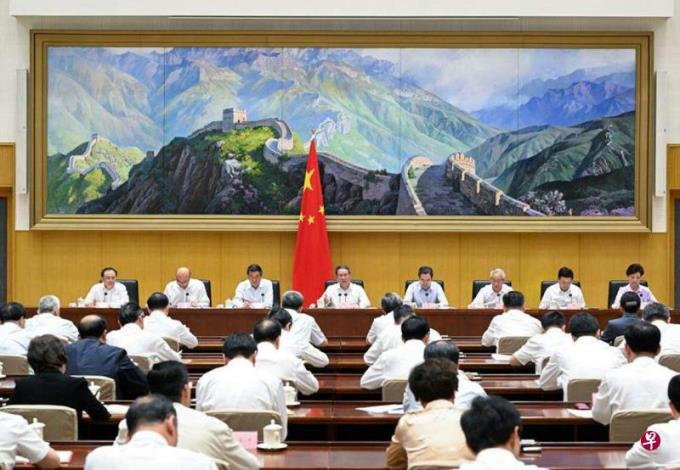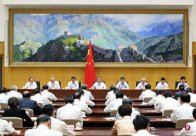
China's macroeconomic has continued to face multiple pressures in the near future. Premier Li Qiang, Premier of the State Council, emphasized that China's economic operation is generally good on Wednesday (August 16).Measures, market confidence has not been boosted.The Hong Kong stock market was involved on Thursday (August 17), and once touched a new low during the year, and moved towards a technical bear market.
Li Qiang hosted a general meeting of the State Council on Wednesday in Beijing to re -deploy the next economic work to ensure the completion of the annual target tasks.
The photos released by Xinhua News Agency showed that four deputy prime ministers including Ding Xuexiang, He Lifeng, Zhang Guoqing, and Liu Guozhong attended.The Minister of Public Security Wang Xiaohong, the Secretary -General of the State Council, Wu Zhenglong, and Xi Yiqin also attended the meeting. This week, Li Shangfu, the Minister of Defense, who visited Russia and White, and Qin Gang, who was removed from the post of foreign ministers.
Li Qiang promised at the meeting to achieve the annual economic goals through "accurately and effectively implementing macro -control and strengthening various policies coordination and coordination".
Li Qiang also demanded to expand domestic demand, continue to expand and expand consumption, promote investment policy space, boost the consumption of community, and mobilize the enthusiasm of private investment; focus on deepening reforms and opening up, in -depth implementation of a new round of state -owned enterprise reform, optimizing the development environment of private enterprises, and optimize the development environment of private enterprises.Attract and use foreign capital greater efforts.
However, the market has not been boosted by Li Qiang's speech, which reflects the Nasdaqin China Index in the United States' performance in the United States.
The Hong Kong Hang Seng Index fell more than 2.3 % on Thursday; the CSI 300 Index also fell 0.9 % at one time, and spit out all the gains since the Political Bureau of the Communist Party of China in July.
TheChina -Thailand International Report pointed out that China's recent economic restoration capacity has slowed down, which has led to the difficulty of attracting incremental funds in the short term of Hong Kong stocks and insufficient investor confidence.
On the occasion of the State Council's Wednesday meeting, the economic problems facing China have intensified.Macro data released this week shows that China's consumption expenditure has grown weak, investment has declined, and the unemployment rate has risen.The People's Bank of China has cut interest rates unexpectedly on Tuesday, the largest decline in the past three years, in order to promote the pace of recovery.
The number of Chinese leading housing companies and the number of projects under construction in China may be breach of contracts, which is four times that of China Evergrande, and further shakes the overall emotions of the Chinese market.Bloomberg quoted sources on Thursday that the Chinese Shadow Bank Giant is planning to reorganize debt. It is the latest financial giant that may face bankruptcy and cause concerns that the real estate crisis may spread.
Fu Fangjian, an associate professor of Li Guangqian Business School of Singapore Management University in an interview with Lianhe Morning Post. At present, the Chinese government does not seem to be willing to "take the old road", and is more inclined to use this economic crisis to force the transformation and upgrading of domestic industries.
Fu Fangjian analyzed that in China, China is currently facing the phenomenon of the two days of ice and fire. When real estate is facing the cold winter, electric vehicles have developed vigorously.He expects that the stimulus policy will be inclined to such high -tech industries. The Chinese government "is willing to support industries and policies will become more and more relaxed, such as new energy and platform economy."
When the housing market, enterprises and residents are in confidence, some public opinion calls for response to higher intensity measures.Cai Yan, a central bank consultant, believes that the most urgent goal is to stimulate residents 'consumption, and all channels need to use all channels to send money to residents' pockets.
On Wednesday, the official think tank researcher Chen Long, the reporter of the Party School of the Communist Party of China, believes that the government should solve the problems of restricting consumer demand for housing, pension, parenting, medical care, and enhance residents' willingness and ability.
Fu Fangjian expects that officials may introduce more policies including subsidies in the next six months to encourage the public to buy new energy vehicles, including possible "new energy vehicles to go to the countryside."The Chinese government may also issue consumer coupons for low -income classes to release the willingness to be suppressed.
Chen Long believes that China still has a financial policy space in expanding domestic demand and should not worry about local debt issues, because the government can still increase support by providing financing for investment.
Fu Fangjian analyzed that the current liabilities in all parts of China are closely related to the depression of the real estate industry. Local governments cannot continue to sell land to create revenue.He believes that China should consider collecting taxes on the first house outside the residents. While average the rich and poor, it should also create new income for local governments from the stock.


